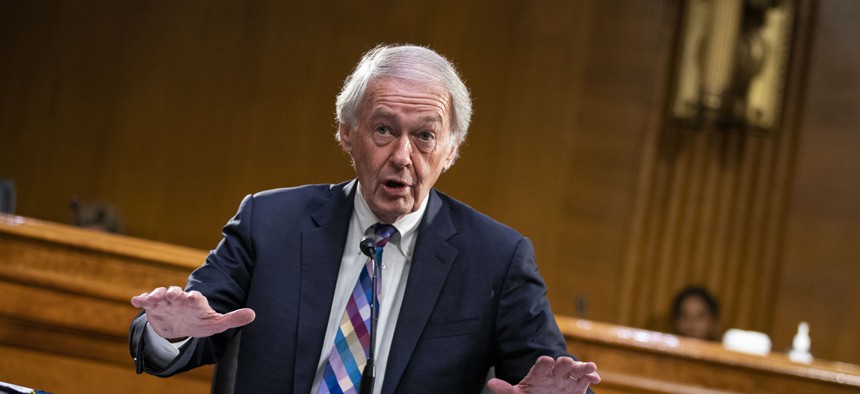Lawmaker questions community doorbell surveillance

Sen. Ed Markey (D-MA) speaks during a Senate Foreign Relations Committee hearing on April 26, 2022 in Washington, DC. Pool / Getty Images

Connecting state and local government leaders
Sen. Edward J. Markey wants more information on “invasive data collection and problematic engagement with police departments” of Amazon’s subsidiary, Ring.
In a June 14 letter to Amazon CEO Andy Jassy, Sen. Edward J. Markey (D-Mass.) asked for clarification of the data privacy arrangements its subsidiary Ring has with local police regarding audio and video from its doorbells.
Smart doorbells, like those made by Amazon (Ring) and Google (Nest), are often equipped with motion sensors, two-way talk, audio and video recording capabilities and Wi-Fi so residents can be notified that someone has come to their door. In some communities, residents upload their video to an app that allows others to view it and police to request access to it. The doorbells have been touted as a law enforcement tool because they deter criminal activity and can provide evidence to police investigations.
Markey, who has previously voiced concern about over-policing, surveillance and bias, wants more information on the company’s “invasive data collection and problematic engagement with police departments.”
The letter cited the doorbell’s ability to collect audio and video beyond the boundaries of the users’ property, a capability Markey said opens individuals to blackmail and stalking and risks “the public’s right to assemble, move, and converse without being tracked.”
But it’s not just the risk to individual privacy that concerns Markey. With the number of Ring users growing past 10 million, “this sweeping data collection and invasive surveillance is particularly concerning in light of Ring’s ongoing engagement with law enforcement,” he wrote.
According to the letter, more than 2,100 policing agencies are participating in Ring’s Neighbors Public Safety Service (NPSS), which includes a platform where police can see residents’ publicly posted content, and request access to that video.
Markey cited reports indicating that some police departments have tried to gain direct access to video in real time, bypassing the company’s video request process. Even when law enforcement does request and gain access, Ring has no restrictions on how downloaded video may be used, he noted.
In 11 detailed questions covering audio recording capabilities and what types and numbers of non-law enforcement agencies use NPSS, Markey asked for clarification on the company’s policies related to non-consensual sharing of residents’ video and what exigent or emergency circumstances would allow Ring to share video with police.
He also wanted to know whether Ring would commit to never incorporating voice recognition technology into its products and to making end-to-end encryption of stored recordings the default option for users.
Markey has questioned Ring’s privacy practices before. In 2019, he raised concerns that the integration of Ring’s cameras with law enforcement could contribute to invasive policing. The company subsequently partnered with the Policing Project at New York University School of Law on an audit related to over-policing, surveillance and bias associated with Ring’s products and has adopted measures that addressed the lawmaker’s concerns, the letter said.
Despite potential abuses, many communities have found doorbell cameras useful enough that they have purchased the systems for local residents. Earlier this year, Winnebago County, Illinois said it would spend $40,000 of its American Rescue Plan funds on doorbell cameras for the community. A non-profit in Battle Creek, Michigan also has plans to give out 500 free Ring doorbell systems. In Elmira, New York, a grassroots organization started a Ring doorbell program that offers free cameras to residents who share video with police.
Chicago recently announced a rebate program for residents that covers the costs of outdoor security cameras, one year of cloud storage for video footage, outdoor motion sensor lighting, vehicle GPS trackers, and subscription costs. Participants have the option of registering their cameras with the police, making video available to law enforcement if it is requested for a criminal investigation. Other cities have put together informal camera registries based on information volunteered by residents.
“As experts point out, when law enforcement actors access Ring users’ video and audio footage, they circumvent key systems of public accountability,” Markey said. “Ring enables police surveillance without public cost, debate, or approval.”
The senator has requested a response by July 4.

NEXT STORY: County to build fiber ring and data center for local governments






